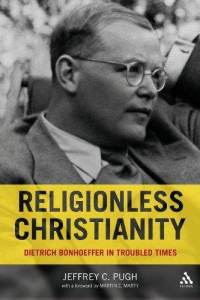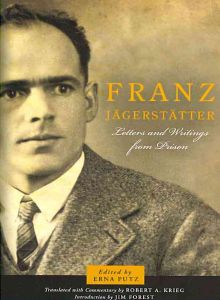Book Note: Victims of Nazism: Bonhoeffer and Jägerstätter
ACCH Quarterly Vol. 15, No. 2, June 2010
Book Note: Victims of Nazism: Bonhoeffer and Jägerstätter
By John S. Conway, University of British Columbia
Keith Clements, The SPCK Introduction to Bonhoeffer (London: SPCK, 2010), 106 pp. ISBN: 978-0-281-06086-3.
Jeffrey C. Pugh, Religionless Christianity. Dietrich Bonhoeffer in Troubled Times (London and New York: T & T Clark International, 2008), 171 pp. ISBN: 0567032590.
Franz Jägerstätter, Letters and Writings from Prison, edited by Erna Putz, translated with commentary by Robert A. Krieg (Maryknoll, NY: Orbis Books, 2009), 252 pp. ISBN: 1570758263.
Dietrich Bonhoeffer was executed on April 9th, 1945, less than a month before the Nazi regime was overthrown, for his involvement with the plot to assassinate Hitler. His tragic death, along with his provocative writings from prison, made him a significant figure in the post-1945 years, when he became Germany’s best-known theologian of recent times. The account of his life, written by his friend Eberhard Bethge, and more recently translated into English by Victoria Barnett, is probably one of the twentieth century’s outstanding biographies. But it is compendious. Hence the need for more concise introductions for newer audiences.
The English author, Keith Clements, and the American scholar, Jeffrey Pugh, have recently supplied us with the latest useful additions to this genre, following in the steps of the Australian John Moses, whose book The Reluctant Revolutionary was reviewed here last year (see Vol. XV, no. 7/8, July/August 2009). Clements, a leading figure inEurope’s ecumenical fraternity, is keen to stress the young Bonhoeffer’s early enthusiasm for the movement which eventually culminated in the World Council of Churches. In those early days, Bonhoeffer felt a strong attraction towards pacifism. His biographers have therefore had to explain why he later came to advocate the forcible overthrow of the Nazi totalitarian system and the murder of Hitler. Clements believes this was because he came to realize that his hopes for a universal Ecumenical Council proclaiming peace to the world was simply unrealistic. Pugh leaves the issue open but points to a change in orientation after 1935 with Bonhoeffer’s greater emphasis on the personal appropriation of faith through the Sermon on the Mount.
Similarly all his recent biographers have felt a need to include a chapter on Bonhoeffer and the Jews. Difficulties arise from the fact that Bonhoeffer’s most significant writing on this subject dates from early 1933, and contains a highly traditional Lutheran view of “reprobate” Judaism and the need for conversion. There are only minor utterances in later years and no references at all to Judaism in his Letters and Papers from Prison. But Moses asserts that Bonhoeffer, along with Karl Barth, led the way in repudiating Christian anti-Judaism and embraced Jews as Jews. On the other hand, Stephen Haynes (see review here Vol. XII, no. 9, September 2006) is sceptical of any claims making Bonhoeffer out to be a precursor of post-Holocaust Christian theology. Clements sits on the fence, but has to admit that such a novel stance can only be inferred, in the absence of any sustained treatment.
 Clements seeks to avoid hagiography, but points out that both in his theology and in his participation in the anti-Nazi Resistance, Bonhoeffer transcended the cultural and political limitations of his generation. In his final chapter he describes how Bonhoeffer’s radical demands have continued to provoke churches and ecumenical communities to renounce their traditional attitudes. Bonhoeffer’s theology, he concludes, will continue to be relevant, because it deals so centrally with the nature of human existence.
Clements seeks to avoid hagiography, but points out that both in his theology and in his participation in the anti-Nazi Resistance, Bonhoeffer transcended the cultural and political limitations of his generation. In his final chapter he describes how Bonhoeffer’s radical demands have continued to provoke churches and ecumenical communities to renounce their traditional attitudes. Bonhoeffer’s theology, he concludes, will continue to be relevant, because it deals so centrally with the nature of human existence.
Pugh equally deplores hagiography on the matter of Bonhoeffer’s legacy in more recent American political controversies. But he also draws parallels, and much of his book seeks to warn his countrymen of the dangers of capitulation to or complicity with the military and political goals of their governing structures of power. The German churches’ attitudes in the 1930s, he asserts, constituted one of Western Christianity’s greatest failures. Bonhoeffer’s prophetic witness and resistance are therefore still significant for us today.
Pugh’s chief emphasis is on Bonhoeffer’s more radical theological challenges as found in his prison letters from the last months of his life. His critique of the religious subculture of his day is one which Pugh seeks to correlate not only to today’s politically obedient churches but also to the current secular states and their ideologies of power. In a world come of age, he asks, where can the individual find guidelines for his own or his community’s behaviour? How can Christianity and Scripture be interpreted in a non-religious sense? We have, he suggests, to respond first to the sufferings created by those who so ruthlessly wield power in the world. The answer lies not in any theology of power, but in the theology of the cross, in “watching with Christ inGethsemane”.
 For Pugh, identification with the suffering and oppressed peoples of the world justifies, both for Bonhoeffer and for us, the need to confront the powers of domination, after so many centuries when the church has so often allowed itself to be compromised. In a world come of age, Christians urgently need to find a new relationship to the power structures so often bent on destructive paths. This is the heart of Pugh’s message, and he sees Bonhoeffer as his mentor in this process. Religionless Christianity bars us from allegiance to any particular church structure or political order, but instead calls us to the discipline of peace and reconciliation so that we may witness to God’s reconciling and healing.
For Pugh, identification with the suffering and oppressed peoples of the world justifies, both for Bonhoeffer and for us, the need to confront the powers of domination, after so many centuries when the church has so often allowed itself to be compromised. In a world come of age, Christians urgently need to find a new relationship to the power structures so often bent on destructive paths. This is the heart of Pugh’s message, and he sees Bonhoeffer as his mentor in this process. Religionless Christianity bars us from allegiance to any particular church structure or political order, but instead calls us to the discipline of peace and reconciliation so that we may witness to God’s reconciling and healing.
Franz Jägerstätter was executed on August 9, 1943 for refusing to serve in a combatant unit of the Nazi Wehrmacht. He was a largely self-taught peasant farmer, living in a small village on the western border ofAustria, and a very devout Catholic. Since Nazi Germany had no tolerance for conscientious objectors, his refusal to serve led to his imprisonment, transfer to Berlin, court-martial, and finally to the guillotine. But sixty years later, in 2007, his resolute witness was recognized by theVatican which approved his beatification in an impressive ceremony attended by his 94-year old widow and descendants. To mark this occasion, an edition of his surviving letters and writings was published, which has been skilfully edited and translated by Robert Krieg, and now made available to the English-speaking audience by the publishing arm of the Maryknoll Fathers inNew YorkState.
Krieg’s useful edition and commentary clearly owes a debt to Dietrich Bonhoeffer’s Letters and Papers from Prison. By a remarkable coincidence, both men were held in Tegel prison inBerlin during several months from May to August 1943, though there is no record that they actually met.
 Jägerstätter’s heroic resistance was first known to the wider world some forty-five years ago when an American pacifist professor, Gordon Zahn, discovered his story in the Austrian church archives, and published his seminal account In Solitary Witness: The Life and Death of Franz Jägerstätter (New York: Holt, Rinehart, and Winston, 1964). Zahn’s book contained long extracts from the surviving letters and testimony. But the present work is more comprehensive, is chronologically arranged, and includes numerous letters to the prisoner from his wife. The picture however remains the same. So does the unresolved enigma of why this peasant farmer should have resolved to adopt this dedicated and costly stance. He was one of only a handful of Catholic conscientious objectors who suffered the same fate. He was not politically engaged, as was Bonhoeffer, nor does he seem to have had contacts with any anti-war or anti-Nazi groups. His was very much a lone decision. The suggestion remains unproven that he had been influenced by Jehovah’s Witnesses, of whom some two hundred were executed during these years for refusing to take up arms or join the army.
Jägerstätter’s heroic resistance was first known to the wider world some forty-five years ago when an American pacifist professor, Gordon Zahn, discovered his story in the Austrian church archives, and published his seminal account In Solitary Witness: The Life and Death of Franz Jägerstätter (New York: Holt, Rinehart, and Winston, 1964). Zahn’s book contained long extracts from the surviving letters and testimony. But the present work is more comprehensive, is chronologically arranged, and includes numerous letters to the prisoner from his wife. The picture however remains the same. So does the unresolved enigma of why this peasant farmer should have resolved to adopt this dedicated and costly stance. He was one of only a handful of Catholic conscientious objectors who suffered the same fate. He was not politically engaged, as was Bonhoeffer, nor does he seem to have had contacts with any anti-war or anti-Nazi groups. His was very much a lone decision. The suggestion remains unproven that he had been influenced by Jehovah’s Witnesses, of whom some two hundred were executed during these years for refusing to take up arms or join the army.
What comes through in his letters is his absolute confidence in his Catholic beliefs, strengthened by an intimate knowledge of the Bible. All the more notable is therefore his unwillingness to agree to any compromise, despite the earnest pleas not only of his family and friends, but also of his priest and bishop. His reflections on “What Every Christian Should Know” and his “Last Thoughts” are moving testimonies of faith, conveying both his passion and his pain, but also his stubborn determination not to take the military oath of obedience to his Führer because the call of Christ came first.
Zahn’s book appeared at the time of the Second Vatican Council where Jägerstätter’s intransigent and unwavering stand received much acclaim. The respectful acknowledgement of his sacrifice may have assisted in bringing about changes in Catholic attitudes towards the morality of war. Subsequent history has reinforced the recognition that Christians have a duty to resist evil even at the cost of their lives. And it is notable that the twentieth century has brought forth more Christian martyrs than ever before. Jägerstätter’s witness is therefore both a voice from the past and a call for similar obedience in the future.
